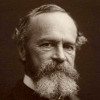“ The woman loves the man the more admiringly the stormier he shows himself, and the world deifies its rulers the more for being willful and unaccountable. But the woman in turn subjugates the man by the mystery of gentleness in beauty, and the saint has always charmed the world by something similar. ”
William James, The Varieties of Religious Experience (1902). copy citation
| Author | William James |
|---|---|
| Source | The Varieties of Religious Experience |
| Topic | beauty mystery |
| Date | 1902 |
| Language | English |
| Reference | |
| Note | |
| Weblink | http://www.gutenberg.org/files/621/621-h/621-h.html |
Context
“and unless he found within us an altogether different faculty of admiration to appeal to, we should pass him by with contempt.
In point of fact, he does appeal to a different faculty. Reënacted in human nature is the fable of the wind, the sun, and the traveler. The sexes embody the discrepancy. The woman loves the man the more admiringly the stormier he shows himself, and the world deifies its rulers the more for being willful and unaccountable. But the woman in turn subjugates the man by the mystery of gentleness in beauty, and the saint has always charmed the world by something similar. Mankind is susceptible and suggestible in opposite directions, and the rivalry of influences is unsleeping. The saintly and the worldly ideal pursue their feud in literature as much as in real life.
For Nietzsche the saint represents little but sneakingness and slavishness.”
source



